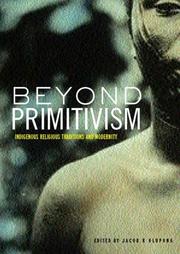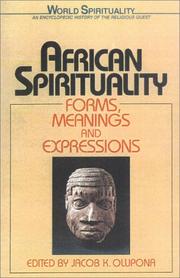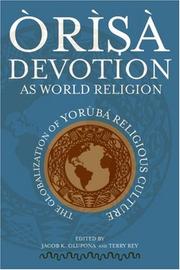| Listing 1 - 10 of 17 | << page >> |
Sort by
|
Book
ISBN: 9780199790586 0199790582 Year: 2014 Publisher: Oxford New York Oxford University Press
Abstract | Keywords | Export | Availability | Bookmark
 Loading...
Loading...Choose an application
- Reference Manager
- EndNote
- RefWorks (Direct export to RefWorks)
What are African religions? African Religions: A Very Short Introduction answers this question by examining primarily indigenous religious traditions on the African continent, as well as exploring Christianity and Islam. It focuses on the diversity of ethnic groups, languages, cultures, and worldviews, emphasizing the continent's regional diversity. Olupona examines a wide range of African religious traditions on their own terms and in their social, cultural, and political contexts. For example, the book moves beyond ethnographic descriptions and interpretations of core beliefs and practices to look at how African religion has engaged issues of socioeconomic development and power relations. --Publisher.
Religion and culture --- Africa --- Religion. --- Religious life and customs. --- Culture and religion --- Culture

ISBN: 1280024895 0203634500 9780203634509 9786610024896 6610024898 9780415273206 041527320X 0415273196 041527320X 9781134481941 9781134481989 9781134481996 9780415273190 Year: 2004 Publisher: New York Routledge
Abstract | Keywords | Export | Availability | Bookmark
 Loading...
Loading...Choose an application
- Reference Manager
- EndNote
- RefWorks (Direct export to RefWorks)
At a time when local traditions across the world are forcibly colliding with global culture, this work explores the future of indigenous religions as they encounter modernity and globalisation.
Indigenous peoples --- Primitivism --- Religion. --- Anthropology --- Religion --- Religion - General --- Social & Cultural Anthropology --- Philosophy & Religion --- Social Sciences --- Aboriginal peoples --- Aborigines --- Adivasis --- Indigenous populations --- Native peoples --- Native races --- Ethnology --- Religious aspects. --- 299.992 --- 299.992 Godsdiensten van primitieve of niet-geciviliseerde volkeren --- Godsdiensten van primitieve of niet-geciviliseerde volkeren --- Indigenous peoples - Religion - Congresses.
Book
ISBN: 9780520948549 0520948548 0520265556 9780520265554 9780520265554 9780520265561 0520265564 9780520265561 Year: 2011 Publisher: Berkeley University of California Press
Abstract | Keywords | Export | Availability | Bookmark
 Loading...
Loading...Choose an application
- Reference Manager
- EndNote
- RefWorks (Direct export to RefWorks)
In a study that challenges familiar Western modes of thought, Jacob K. Olupona focuses on one of the most important religious centers in Africa and in the world: the Yorùbá city of Ilé-Ifè in southwest Nigeria. The spread of Yorùbá traditions in the African diaspora has come to define the cultural identity of millions of black and white people in Brazil, Cuba, Puerto Rico, Trinidad, and the United States. Seen through the eyes of a native, this first comprehensive study of the spiritual and cultural center of the Yorùbá religion tells how the city went from great prominence to near obliteration and then rose again as a contemporary city of gods. Throughout, Olupona corroborates the indispensable linkages between religion, cosmology, migration, and kinship as espoused in the power of royal lineages, hegemonic state structure, gender, and the Yorùbá sense of place, offering the fullest portrait to date of this sacred African city.
Yoruba (African people) --- Gods, Yoruba --- Religious pluralism --- Religion and politics --- Religions --- Ethnic groups --- Ethnic identities --- Ethnic nations (Ethnic groups) --- Groups, Ethnic --- Kindred groups (Ethnic groups) --- Nationalities (Ethnic groups) --- Peoples (Ethnic groups) --- Ethnology --- Pluralism (Religion) --- Pluralism --- Religion --- Gods, Yoruba (African people) --- Yoruba gods --- Gods, Umbanda --- Yariba (African people) --- Yooba (African people) --- Yorubas --- Religion. --- History. --- African influences. --- Ife (Nigeria) --- Africa, Sub-Saharan --- Ile-Ife (Nigeria) --- Ethnic groups - Africa - Religion. --- RELIGION / Comparative Religion --- Africa --- History --- Nigeria --- African influences --- Ife --- africa. --- african diaspora. --- african religion. --- brazil. --- city of gods. --- colonialism. --- comparative religion. --- cosmology. --- cuba. --- diaspora. --- empire. --- gender. --- immigration. --- imperialism. --- kinship. --- migration. --- motherland. --- mythology. --- nigeria. --- nonfiction. --- puerto rico. --- religion. --- royalty. --- sacred places. --- spirituality. --- trinidad. --- western world. --- yoruba religion. --- yoruba.

ISBN: 0824507800 0824507940 Year: 2000 Publisher: New York Crossroad
Abstract | Keywords | Export | Availability | Bookmark
 Loading...
Loading...Choose an application
- Reference Manager
- EndNote
- RefWorks (Direct export to RefWorks)
Book
ISBN: 3110122200 3111788032 3110850079 Year: 1993 Volume: vol 32 Publisher: Berlin De Gruyter
Abstract | Keywords | Export | Availability | Bookmark
 Loading...
Loading...Choose an application
- Reference Manager
- EndNote
- RefWorks (Direct export to RefWorks)
Sociology of religion --- Africa --- 299.6 --- 266.2*0 <6> --- Religious pluralism --- -Theology, Doctrinal --- -Christianity --- Religions --- Church history --- Christian doctrines --- Christianity --- Doctrinal theology --- Doctrines, Christian --- Dogmatic theology --- Fundamental theology --- Systematic theology --- Theology, Dogmatic --- Theology, Systematic --- Theology --- Pluralism (Religion) --- Pluralism --- Religion --- Godsdiensten van Bantoes, Niloten, Soedannegers, Pygmeeën, Kaffers, Hottentotten, Bosjesmannen, Galla's, Bassuto's, Zoeloes --- Lokale theologieën. Indigenisatie. Acculturatie--(algemeen)--Afrika --- Doctrines --- Mbiti, John S. --- Religion. --- Theology, Doctrinal --- -Godsdiensten van Bantoes, Niloten, Soedannegers, Pygmeeën, Kaffers, Hottentotten, Bosjesmannen, Galla's, Bassuto's, Zoeloes --- 266.2*0 <6> Lokale theologieën. Indigenisatie. Acculturatie--(algemeen)--Afrika --- 299.6 Godsdiensten van Afrikaanse zwarte volkeren --- 299.6 Godsdiensten van Bantoes, Niloten, Soedannegers, Pygmeeën, Kaffers, Hottentotten, Bosjesmannen, Galla's, Bassuto's, Zoeloes --- Godsdiensten van Afrikaanse zwarte volkeren --- -299.6 Godsdiensten van Afrikaanse zwarte volkeren --- Theology [Doctrinal ] --- Mbiti, John --- Mbiti, John Samuel
Book
ISBN: 0253018900 025301896X 9780253018960 9780253018823 025301882X 9780253018908 0861591054 Year: 2016 Publisher: Bloomington
Abstract | Keywords | Export | Availability | Bookmark
 Loading...
Loading...Choose an application
- Reference Manager
- EndNote
- RefWorks (Direct export to RefWorks)
With essays from the most respected scholars in the field, the book makes a substantial contribution toward understanding Ifá and its role in contemporary Yoruba and diaspora cultures.
Ifa (Religion) --- Afro-Caribbean cults. --- Orisha religion. --- Divination. --- Yoruba (African people) --- Fa (Religion) --- Ifa --- Ifa (Cult) --- Afro-Caribbean cults --- Cults --- Cults, Afro-Caribbean --- Orisa religion --- Shango --- Shango (Cult) --- Religions --- Augury --- Soothsaying --- Occultism --- Worship --- Art. --- Religion. --- Ifa (Religion). --- Ifa. --- Afro-Caribbean religions.
Book
ISBN: 9780268203146 9780268203139 0268203148 026820313X 9780268203153 9780268203122 Year: 2022 Publisher: Notre Dame University of Notre Dame Press
Abstract | Keywords | Export | Availability | Bookmark
 Loading...
Loading...Choose an application
- Reference Manager
- EndNote
- RefWorks (Direct export to RefWorks)
Pentecostal pastors enjoy an unprecedented authority in contemporary Nigerian society, exerting significant influence on politics, public policy, popular culture, and the moral imagination. In Pastoral Power, Clerical State, Ebenezer Obadare investigates the social origins of clerical authority in modern-day Nigeria with an eye to parallel developments and patterns within the broader African society. Obadare focuses on the figure of the pastor as a bearer of political power, thaumaturgical expertise, and sexual attractiveness who wields significant influence on his church members. This study makes an important contribution to the literature on global Pentecostalism. Obadare situates the figure of the pastor within the wider context of national politics and culture and as a beneficiary of the dislocations of the postcolonial society in Africa’s most populous country. Obadare calls our attention to the creative ways in which Nigeria’s Pentecostal pastors utilize religious doctrines, beckon spiritual forces, and manipulate their alliances with national powerbrokers to consolidate their influence and authority. In contrast to rapidly eroding pastoral authority in the West, pastoral authority is increasing in Nigeria. This engaging book will appeal to those who want to understand the far-reaching political and social implications of religious movements—especially Christian charismatic and evangelical movements—in contemporary African societies. It will be of interest to scholars and students of sociology, religion, political science, and African studies.
Book
ISBN: 9781138596986 9780429487231 1138596981 Year: 2020 Publisher: New York, NY Routledge
Abstract | Keywords | Export | Availability | Bookmark
 Loading...
Loading...Choose an application
- Reference Manager
- EndNote
- RefWorks (Direct export to RefWorks)
Violence --- Emigration and immigration --- Human rights --- Sex role --- Religious aspects --- Religious aspects --- Religious aspects

ISBN: 0299224600 0299224643 Year: 2007 Publisher: Madison University of Wisconsin press
Abstract | Keywords | Export | Availability | Bookmark
 Loading...
Loading...Choose an application
- Reference Manager
- EndNote
- RefWorks (Direct export to RefWorks)
Gods, Yoruba --- Orishas --- Yoruba (African people) --- Religion
Book
Abstract | Keywords | Export | Availability | Bookmark
 Loading...
Loading...Choose an application
- Reference Manager
- EndNote
- RefWorks (Direct export to RefWorks)
Ebenezer Obadare examines the overriding impact of Nigerian Pentecostal pastors on their churches, and how they have shaped the dynamics of state-society relations during the Fourth Republic.Pentecostal pastors enjoy an unprecedented authority in contemporary Nigerian society, exerting significant influence on politics, public policy, popular culture, and the moral imagination. In Pastoral Power, Clerical State, Ebenezer Obadare investigates the social origins of clerical authority in modern-day Nigeria with an eye to parallel developments and patterns within the broader African society.Obadare focuses on the figure of the pastor as a bearer of political power, thaumaturgical expertise, and sexual attractiveness who wields significant influence on his church members. This study makes an important contribution to the literature on global Pentecostalism. Obadare situates the figure of the pastor within the wider context of national politics and culture and as a beneficiary of the dislocations of the postcolonial society in Africa's most populous country. Obadare calls our attention to the creative ways in which Nigeria's Pentecostal pastors utilize religious doctrines, beckon spiritual forces, and manipulate their alliances with national powerbrokers to consolidate their influence and authority.In contrast to rapidly eroding pastoral authority in the West, pastoral authority is increasing in Nigeria. This engaging book will appeal to those who want to understand the far-reaching political and social implications of religious movements--especially Christian charismatic and evangelical movements--in contemporary African societies. It will be of interest to scholars and students of sociology, religion, political science, and African studies.
Ethnology --- Religion and politics --- Africa, west --- Pentecostalism --- Social science --- Religion --- History
| Listing 1 - 10 of 17 | << page >> |
Sort by
|

 Search
Search Feedback
Feedback About UniCat
About UniCat  Help
Help News
News